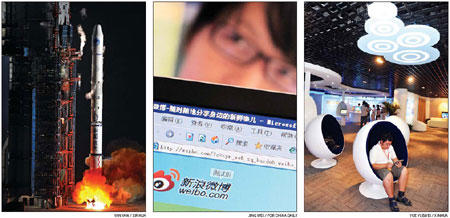Tech wonders set to change the world
Updated: 2012-01-10 08:55
By Eric Jou (China Daily)
|
||||||||
Cloud computing
Cloud computing has been in practice for quite a while now. The story of conducting calculations on super computers halfway around the world by just inputting data and sending it over via the Internet isn't new. Cloud has been affecting our lives since the time the earliest e-mail service providers such as Hotmail, Gmail, and Yahoo arrived on the scene.
But cloud is changing. It's become more mainstream, dynamic and flexible than just simple e-mail. In 2011 we saw the launch of two major cloud-based services offered by two of the biggest tech companies in the world, Apple and Microsoft.
Apple's offering, the iCloud, is a media server accessible anywhere in the world. Microsoft, on the other hand, offers productivity anywhere in the form of Office 365. With new iPads and iPhones offering users the option of signing onto cloud, this could have a bigger impact once it truly catches on.
 |
|
Left: Carrying a satellite - the 10th among China's indigenous global navigation and positioning network, known as Beidou - a Long March III-A rocket takes off from a base in Southwest China's Sichuan province, on Dec 2, 2011. The Beidou network will be completed in 2020, with 30 satellites orbiting the Earth. |
Beidou
The US Global Positioning System (GPS) has become much more than just a mapping tool. It now determines social behavior. For instance, interacting through phone apps might give away one's location to friends and families, just as it would help point one to the coolest bars and restaurants in a city.
Beidou, China's entry into the Global Positioning Satellite club, is stated to be more accurate than GPS and compatible with all GPS devices. It could make traveling through China totally hassle-free.
The arrival of Beidou also signifies less dependence on and more competition with the traditionally American GPS system.
Tiangong-1
The successful launch of the Tiangong-1 is both a significant achievement for China and space travel in general. Planned as a test bed for China's future space station, the Tiangong-1 is meant to explore what man might do in space.
Launched into space on Sept 29, the Tiangong-1, which translates in Chinese as Heavenly Palace 1, is expected to be the first step toward China's ambition to build a modular space station, made up of multiple interlocking parts, in keeping with international standards.
Tiangong-1 is currently orbiting the Earth and is expected to be visited by manned missions in 2012.
Android 4.0
Google's Android operating system is currently the world's leading mobile operating system, still growing at an extraordinary pace, and in China it's no different.
Google's open-sourced operating system, called Desert, didn't really take off until version 2.3 Gingerbread, but Android, for all its virtues, has always felt like an incomplete operating system.
In 2011 Google changed all that with two major releases, Android 3.0 Honeycomb and Android 4.0 Ice Cream Sandwich. 3.0 was an operating system that Google had in mind for Android tablets. It was a tablet-based operating system, meant to compete with the iPad. Android 4.0 took a different approach; it merged the tablet and phone operating systems into one.
Android 4.0 is the first of its kind that looks and feels like a complete operating system, as well as a real iOS competitor. Android 4.0 also introduced features - such as facial recognition locks and near field communication payments - that might soon be seen in every smart phone.

 Relief reaches isolated village
Relief reaches isolated village
 Rainfall poses new threats to quake-hit region
Rainfall poses new threats to quake-hit region
 Funerals begin for Boston bombing victims
Funerals begin for Boston bombing victims
 Quake takeaway from China's Air Force
Quake takeaway from China's Air Force
 Obama celebrates young inventors at science fair
Obama celebrates young inventors at science fair
 Earth Day marked around the world
Earth Day marked around the world
 Volunteer team helping students find sense of normalcy
Volunteer team helping students find sense of normalcy
 Ethnic groups quick to join rescue efforts
Ethnic groups quick to join rescue efforts
Most Viewed
Editor's Picks

|

|

|

|

|

|
Today's Top News
Health new priority for quake zone
Xi meets US top military officer
Japan's boats driven out of Diaoyu
China mulls online shopping legislation
Bird flu death toll rises to 22
Putin appoints new ambassador to China
Japanese ships blocked from Diaoyu Islands
Inspired by Guan, more Chinese pick up golf
US Weekly

|

|






